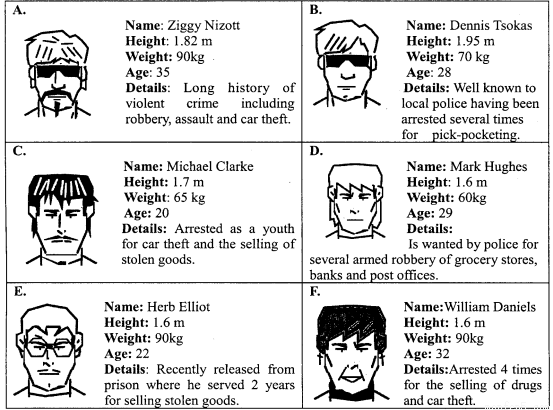题目内容
I saw the old man, with his untidy clothes and messy hair, as he dashed between the rows of the department store. He was trying to be ordinary but he was hard not to __ .
He the saleswoman and with a slight , possibly German, asked where the women’s shoes were sold. “Fourth floor.” She responded in a voice I could hear 10 miles away. “Pardon? Where did you say they were?” he asked again, apparently . Clearly the old man was somewhat “Fourth floor, sir,” the friendly saleswoman replied patiently, this time so that customers turned to see what was causing the .
I continued watching as the man thanked the saleswoman and for what I assumed was the fourth floor. But rather than walk to the or the lift, he dashed behind a shelf, took out a notebook and started writing hurriedly, with an almost mad on his face. Then he went straight up to another saleswoman and asked where the women’s shoes were sold. Again he asked her to the answer and once more he walked away and took down some notes.
He did this three more times before a department store , thinking him mad, removed him from the store. But rather than be , the old man departed with a huge smile on his face. Although the incident was , it was not until a year later, during my first year of university, that I gave it any further . I walked into my language classroom and met my professor. It was that very same man.
1.A. see B. notice C. neglect D. find
2.A. followed B. interviewed C. chose D. approached
3.A. doubt B. voice C. accent D. smile
4.A. confused B. amused C. annoyed D. tired
5.A. silly B. shy C. deaf D. weak
6.A. angrily B. loudly C. suddenly D. quickly
7.A. disturbance B. accident C. pleasure D. quarrel
8.A. put away B. passed away C.pulled away D. headed off
9.A. shoes B. stairs C. exit D. sign
10.A. confusion B. appearance C. pain D. expression
11.A. reply B. recite C. repeat D. retell
12.A.security-guard B. customer C.saleswoman D. policeman
13.A. excited B. embarrassed C. relaxed D. moved
14.A. unusual B. serious C. dangerous D.unforgettable
15.A. wonder B. sense C. thought D. idea
1.B
2.D
3.C
4.A
5.C
6.B
7.A
8.D
9.B
10.D
11.C
12.A
13.B
14.A
15.C
【解析】
试题分析:在商店里一位老人用带着方言的口音再三问一些女售货员卖女鞋的地方,然后在一个笔记本里偷偷记录着什么。即使是遭到顾客们的围观和商店保安的驱赶也没有感到难堪。这件事在我上了大学看到教语言学的教授才明白了。教授是在研究方言的交际运用的问题吗?
1.看见;B. notice注意;C. neglect忽视;D. find发现。他正在努力显得很普通但是他很难不被人注意到。故选B。
2.跟踪、理解;B. interviewed采访、面试;C. chose选择; D. approached走近。他走近女售货员,后面是问女士的鞋子在哪里买,所以这里应该是走近去问路。故自选D。
3.怀疑;B. voice声音;C. accent口音;D. smile微笑。用稍微带一点很可能是德语的口音问了一个问题。根据后面的German可知是老人说话带着地方音。故选C。
4.迷惑的;B. amused愉悦的、有趣的;C. annoyed烦恼的;D. tired累的。一遍一遍地问,显然说明他很迷惑不解,没听明白。故选A。
5.傻;B. shy害羞;C. deaf耳聋的;D. weak身体虚弱的。女售货员的声音从10里地以外的地方都能听到而站在的对面的老人却听不到,只能理解成老人可能是耳聋。故选C。
6.生气地;B. loudly大声;C. suddenly突然;D. quickly快速地。女售货员的声音很大声音才会导致一些顾客的围观。故选B。
7.干扰、骚乱;B. accident事故;C. pleasure快乐;D. quarrel争吵。人们都走过来看到底是什么原因导致这么大声的吵闹。故选A。
8.放好;B. passed away去世;C.pulled away脱身; D. headed off转移方向去。老人谢过那位女售货员,然后转身朝着我认为的四楼走去。故选D。
9.鞋子;B. stairs楼梯;C. exit出口;D. sign指示牌、手势。根据后面的lift电梯可知,老人没有走向楼梯或者电梯,而是冲到一个架子后面,拿出一个笔记本开始匆匆忙忙地写着。故选B。
10.迷惑;B. appearance外貌;C. pain痛苦;D. expression表情。老人脸上几乎是疯狂的当然应该是表情。故选D。
11.回答;B. recite背诵;C. repeat重复;D. retell复述。和前面的一样,他问另一位女售货员同样的问题,同样的重复了刚才的那一幕。故选C。
12.保安;B. customer顾客;C.saleswoman女售货员;D. policeman警察。一个百货商店的保安认为他疯了,把他从商店赶出去之前,他又这样做了三次。商店的保安有职责保证商店的安全,所以才把他从商店赶出去。故选A。
13.激动;B. embarrassed尴尬;C. relaxed放松;D. moved感动。老人不但没有感动尴尬,反而脸上挂着大大的笑容离开了。被保安赶出去,按常理应该感到很难堪,故选B。
14.不同寻常;B. serious 严肃;C. dangerous危险; D. unforgettable难忘。尽管这件事很不同寻常,才和后面的再思考一致,这件事不一般是思考之一,进一步思考是看到教我语言学的老师就是那位老人。故选A。
15.好奇;B. sense感觉;C. thought思考;D. idea想法。一年以后,我上大学一年级,才对那件事有了进一步的思考。教我语言学的老师就是那位老人。故选C。
考点:故事类短文阅读。

 天天向上一本好卷系列答案
天天向上一本好卷系列答案 小学生10分钟应用题系列答案
小学生10分钟应用题系列答案根据下列要点用英语写一篇100-120词左右的短文。
高二阶段学习比较紧张,正确的学习方法尤为重要。下表显示了两位同学不同的学习方法,请简述并发表你的观点。 文章开头已经给出。
学习方法 | 李华 | 王海 | 你的观点 |
白天 | 上课专心听讲,尽可能经常向老师请教疑难问题。 | 上课打瞌睡,漏掉了许多要点。 |
|
晚上 | 花较少时间完成作业,早点休息,上课经常保持旺盛的精力 | 花较多的时间完成作业,熬夜学习,导致注意力无法集中。 |
|
参考词汇: attentively 专心 energetic 精力旺盛
concentrate on 集中精力于 effectively 有效地
Li Hua and Wang Hai are two students of Senior Two.Both of them work hard but they have different learning methods.
__________________________________________________________________________
__________________________________________________________________________
__________________________________________________________________________
__________________________________________________________________________
__________________________________________________________________________
__________________________________________________________________________
第一节:基础写作(共1小题,满分15分)
智能手机(smart-phone)的使用现在已经非常普遍了,尤其是在年轻人当中。它在给我们带来方便的同时,也带来了一些问题:
1、网络聊天使得人与人之间缺乏面对面的交流,造成人际交往困难;
3、青少年沉迷于网络游戏,导致睡眠质量差,上课睡觉,并影响身体健康;
4、学生甚至做作业也依赖智能手机,不愿自己独立思考。
5、你的观点…… |
【写作内容】
1.智能手机带来的问题;
2.你的观点。
【写作要求】
只能用5个句子表达全部内容。文章开头已给出
The smart-phone has brought us great convenience. However, it has also brought us some problems.________________________________________________________________
________________________________________________________________
________________________________________________________________
________________________________________________________________
